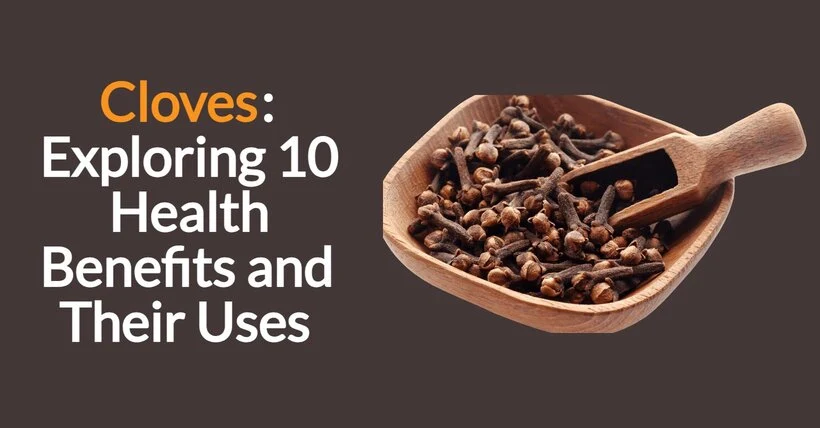Cloves, scientifically known as Syzygium aromaticum, are renowned for their medicinal properties, which include pain relief, antimicrobial effects, and even libido enhancement. They are rich in essential nutrients like vitamins A, E, and beta-carotene. Cloves can be consumed directly, added to foods, or applied topically in oils or creams for health and cosmetic benefits.
Available in grocery stores, pharmacies, or as essential oils in health shops, cloves are versatile and easy to incorporate into daily routines.
The Key Health Benefits of Cloves
1. Pain Relief
Eugenol, a major component of cloves, is commonly used in dentistry to alleviate pain and inflammation. Studies show that it reduces pain by inhibiting prostaglandins and other inflammatory agents, lowering sensitivity in pain receptors.
2. Natural Insect Repellent
The strong aroma of cloves naturally deters insects. For home use, crushed cloves can be placed in bowls, or inserted into citrus fruits. Clove-scented products like candles or essential oil diffusers can also keep pests away effectively.
3. Libido Enhancement
Clove extract has aphrodisiac properties that may help boost sexual desire and treat mild sexual dysfunction.
4. Antioxidant and Cancer-Fighting Properties
Cloves are loaded with phenolic compounds, giving them strong antioxidant activity that protects cells from oxidative stress and may help reduce the risk of chronic diseases, including certain cancers.
5. Fighting Bacterial and Fungal Infections
Cloves contain compounds such as eugenol, gallic acid, and kaempferol, which inhibit the growth of bacteria like Staphylococcus and E. coli, as well as fungal pathogens. They work by disrupting cell membranes and protein function in microbes.
6. Freshening Breath
The natural antiseptic properties of cloves make them effective against bad breath. Chewing cloves or using clove tea as a mouth rinse can help maintain oral hygiene.
7. Improving Digestion
Cloves stimulate digestive enzymes, helping alleviate gas, bloating, and indigestion. Clove tea can be especially useful after consuming gas-producing foods.
8. Accelerating Wound Healing
Topical application of clove oil or creams may speed up the healing of minor cuts and skin irritations due to its antiseptic and anti-inflammatory properties.
9. Muscle Relaxation and Fatigue Relief
Clove oil can relax sore muscles when applied as massage oil and its aroma helps improve mood and reduce fatigue.
10. Supporting Heart Health
Preliminary studies suggest that clove oil may help lower blood pressure by relaxing blood vessels, though it should not replace conventional treatment.
How to Incorporate Cloves into Your Routine
Clove Tea
For optimal benefits, cloves are best consumed as tea:
- Fresh cloves: Boil 10g in 1L of water for 15 minutes, strain, and drink up to 3 times daily.
- Powdered cloves: Mix 300–500 mg in water, 2–3 times daily.
Using Clove Essential Oil
Apply 2–3 drops on a cotton ball for topical use, or add to massage oils. Commercial clove creams and gels are also available.
Culinary Uses
Cloves can be added to baked goods, soups, stews, and desserts to enhance flavor and benefit from their medicinal properties.
Precautions
Avoid cloves during pregnancy, breastfeeding, in children under 6, or in individuals with ulcers or gastritis. Cloves may also cause irritation in some people and can interfere with blood clotting; avoid before surgery.
FAQ – Health Benefits and Uses of Cloves
What are the main health benefits of cloves?
Cloves offer multiple benefits, including pain relief, antimicrobial effects, antioxidant activity, improving digestion, freshening breath, supporting heart health, boosting libido, accelerating wound healing, and muscle relaxation.
How can I consume cloves for health benefits?
Cloves can be consumed as tea (boil fresh cloves or use powdered cloves), added to meals and baked goods, or used in supplements. Essential oils can also be applied topically or added to massage oils.
Can cloves be used topically?
Yes. Clove essential oil or clove-infused creams can be applied to minor cuts, skin irritations, or sore muscles for antiseptic, anti-inflammatory, and analgesic effects.
Are there any precautions for using cloves?
Avoid cloves during pregnancy, breastfeeding, in children under 6, or if you have ulcers, gastritis, or are about to undergo surgery (due to blood clotting effects). Some people may experience irritation.
How do cloves help with pain relief?
Eugenol, a major compound in cloves, inhibits inflammatory agents and reduces sensitivity in pain receptors, making it effective for toothache, minor pains, and inflammation.
Can cloves improve digestion?
Yes. Cloves stimulate digestive enzymes, helping relieve gas, bloating, and indigestion. Drinking clove tea after meals can be especially beneficial.
References
- Haro‑González et al., Clove Essential Oil (Syzygium aromaticum): Biological activities & health applications review — PubMed
- Haro‑González et al. (2021), Clove Essential Oil review with anti‑inflammatory & anticancer activity — PMC
- Cortés‑Rojas et al., Clove (Syzygium aromaticum) biological activities — PMC
- Medical News Today — Cloves: Health benefits, risks, and uses
- Herbpy overview — Evidence‑based health benefits of cloves

Comments